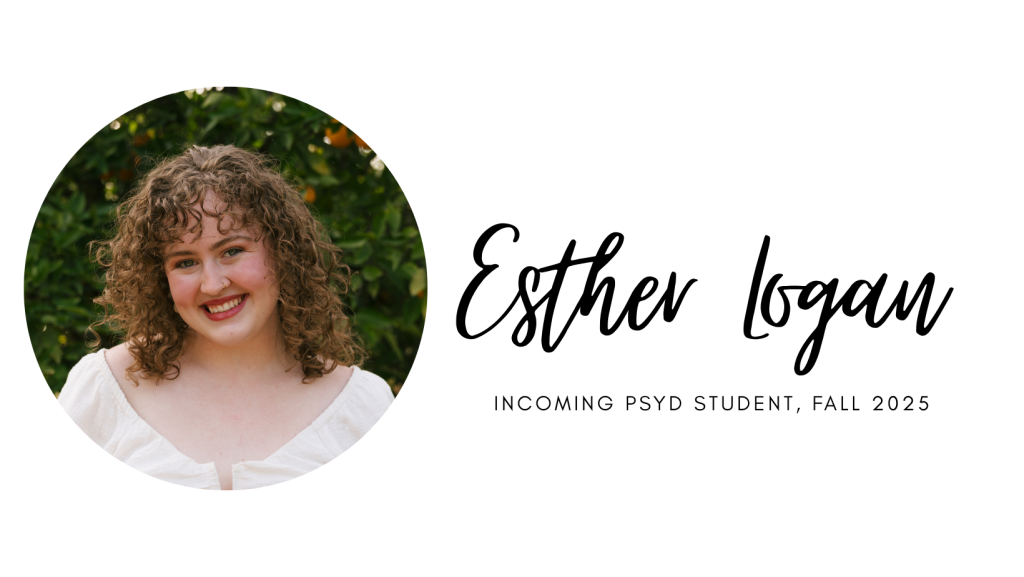Applying to Grad School – Part 1: The Emotional Journey
Many psychology students wonder about graduate school: which program is right for them and how to navigate the application process. In this three-blog series, you can hear from one of CBU’s PsyD faculty on the why, who, and how of the PsyD program, and you can hear from the CSHB student worker, recently accepted into CBU’s PsyD program, as she reflects on the emotional journey and the nitty gritty of navigating the application process.

Applying for graduate school is no easy task. It can carry a different weight than what I remember feeling when I applied for college. For me, it not only felt like a daunting step, but I found myself in an entirely new season of life fraught with unknowns. But whether you’re like me, someone who likes to create plans and take it slow in the application process or whether you’re someone who does an entire application in one go: applying to grad school can be emotionally and mentally challenging.
I had known since my freshman year of college that I wanted to attend grad school. Although I was a music major, I quickly realized that I felt called to a career in psychology instead. I knew that to work in the mental health world, I would need a graduate degree. I added a Psychology minor to dip my toes in and learn some foundational aspects of clinical psychology, in preparation for my eventual application. Throughout my undergrad career, I prayed about what graduate degree would be the “right” for me. I felt conflicted because various aspects of the mind and mental health intrigued me. Still, I couldn’t quite decide on what avenue seemed best. A Master’s degree in Marriage and Family Therapy? Counseling Psychology? A Doctorate of Psychology (PsyD) in Clinical Psychology? As I evaluated these decisions, I was prepared to work hard to complete my applications. What I was not ready for was the intense amount of work and emotional wear that it would have on me.

In this blog I want to share my experience with you to normalize the emotions you may feel as you navigate your own application process and, hopefully, to help you better prepare for it.
Going into my application, I did not think there would be an emotional side to the process. Sure, I knew I would write about and discuss my passion and emotions regarding psychology during interviews. Still, I wasn’t prepared for all of the emotions I would FEEL.
The first really challenging emotional whirlwind was coming to terms with what exactly was the best course of action for grad school. I needed to decide on the exact program that felt right for me and the right school. I think there’s this pressure I had felt that you must apply everywhere you possibly can. But as I was meeting and researching various schools, I noticed that I kept having so many thoughts in the back of my head of “Well, CBU doesn’t do that” or “Hm, that’s a huge con compared to CBU.” Perhaps my inherent bias has come with completing my undergraduate degree here. Still, it just seemed like every phone call or meeting increased my reasons for why that school wasn’t as good a fit as CBU. So, my first emotional tip would be to examine your gut in WHERE you apply. If you keep feeling drawn to a specific place or vice versa, gravitating away from other options, take some time to try to figure out why! There may be a good reason why your unconscious is pushing you in one direction or another.
One of my most significant emotional battles was not feeling qualified or “good enough.” A mentor of mine did an incredible job at reminding me that not only is imposter syndrome and these doubts incredibly normal (and felt by almost everyone!!), but that these were lies from the enemy. I experienced these doubts and insecurities when focusing on the writing portion, resume, and the interview process. I was incredibly skilled at coming up with every single reason why they shouldn’t let me into the program. The reality is that often, the “thing” that you are afraid will be your downfall may set you apart! No matter what, it will allow for growth. For me, I felt like I was “behind” all my fellow applicants because I had a degree in music instead of psychology. I had almost no research experience and little education in clinical psychology. I have learned that these aspects were some of my most extraordinary characteristics for grad school. Being in music has taught me how to manage an incredibly demanding schedule, how to prioritize, and a powerful work ethic. My lack of research experience allows my professors and mentors to come alongside me and teach me how to perform research from the ground up. I learned to see the strengths and skills my experiences gave me, even if my path to the program was not necessarily conventional.

Another interesting side of my emotional journey in this process was the mental and emotional weight of it all. I found myself allowing myself to give up so much brain space to the whole process. Every day, I spent hours thinking about all of the “what ifs” or plan Bs I needed to work on in case grad school didn’t work out on my first try. I was living inside all my worries and doubts about my future instead of what was currently happening in my life. Let me be clear: there is nothing wrong with having secondary or tertiary plans for various situations. I would argue that it is very wise to do so! But my issue was that I was focusing so much of my energy on stressing about my application that it was working its way into my times of work, school, leisure, and rest. I knew something had to be out of balance when I kept having dreams about ways I could be reworking my essay.
I realized during this season that so much of the emotional strain I was under was a direct result of my lack of trust in God in the whole situation. I am one to try and take the reins from God and declare that I do indeed “have it.” It’s an area in my life that seems to sneak up quietly and seep into everything I do. But I can assure you, friends, that God’s will willbe done no matter how hard you try to take over or how much effort you put in. So why not do your best with what you have and trust that the Lord will manage the outcome? I know this is MUCH easier said than done, but it can be accomplished through baby steps.

In the next blog I will discuss the actual nitty-gritty parts of this undertaking, you can make sure to read it HERE. Remember that if you ever find yourself feeling alone and struggling to get through this process, please know that you are not alone. Take the time to reach out to the community you have around you and call on their support and care as you continue. Additionally, if this process does end in success, having this community by your side to champion and help you will be vital!

0 Comments